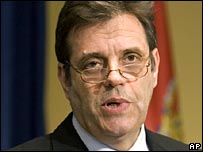
Mr Kostunica is at odds with President Tadic
|
Serbia's Prime Minister Vojislav Kostunica has said his coalition has collapsed and is calling for elections. The move follows his failure to get his cabinet to reject closer ties with the European Union in the wake of Kosovo's declaration of independence.
Mr Kostunica, a nationalist, has described the decision by EU states to recognise Kosovo as illegal.
Serbian President Boris Tadic has said he will call elections, but did not set a date for the poll.
"I respect the prime minister's decision that he is no longer able to lead the government of Serbia and when I get the government's decision, I will call an election," he said in a statement.
"Elections are the democratic way to overcome political crises and the people are the only ones who have right to decide which is the way forward for Serbia."
Secret plan
Mr Tadic says Belgrade will only be able to defend its right to Kosovo if it joins the EU.
Kosovo declared its independence from Serbia on 17 February.
The United States and major EU countries have recognised it as independent.
Serbia, backed by its ally, Russia, says it will never accept an independent Kosovo.
The government in Belgrade has allegedly agreed a secret plan against Kosovo and countries that recognise it.
It is unclear what it contains.
May polls?
Mr Kostunica's Democratic Party of Serbia (DSS) split with its coalition partner, the Democratic Party (DS) of Mr Tadic, over policy towards the EU in the wake of Kosovo's independence declaration.
The outgoing prime minister has maintained that ties can improve only if the EU rejects Kosovo's declaration of independence.
Belgrade has reacted angrily to an EU mission to ease Kosovo's transition.
The DSS is backing a draft resolution from the opposition nationalist Radical Party, condemning the EU's 1,800-strong mission to Kosovo as illegal and calling on countries to overturn their decision to recognise it.
But a number of pro-Western ministers have failed to support Mr Kostunica's approach.
"The government of Serbia has no united policy any more on an important issue related to the future of the country - Kosovo as a part of Serbia," Mr Kostunica told reporters as he announced his move in Belgrade.
"Such a government could not function any more," he said.
Mr Kostunica said "we should return the mandate to the people" - and added that he had scheduled a cabinet meeting on 10 March to propose calling for early elections to be held on 11 May - the date for Serbia's local elections.
No party has a majority in the Serbian parliament.
The political establishment in Serbia has been deeply divided over the way forward and a general election would be the first opportunity for the people of Serbia to express their views, says the BBC's Nick Hawton in Belgrade.


~RS~q~RS~~RS~z~RS~55~RS~)
Bookmark with:
What are these?